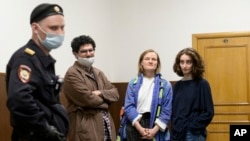An 18-member group of nations, including the United States and United Kingdom, has expressed “deep concern” over what it calls the Russian government’s “intensifying harassment of independent journalists and media outlets” in the country.
In a statement issued on October 28 under the name of the Media Freedom Coalition, was also signed by Ukraine and North Macedonia, along with Australia, Canada, the Czech Republic, Denmark, France, Germany, Greece, Iceland, Latvia, Lithuania, the Netherlands, New Zealand, Slovakia, and Slovenia.
The statement said that “media freedom is vital to the effective functioning of free and open societies and is essential to the protection of human rights and fundamental freedoms.”
Russian authorities have been accused of increasingly cracking down on independent media outlets, civil society groups, rights activists, and others, using legislations on “undesirable” individuals or groups, as well as the so-called “foreign agents” law.
The 18-nation statement said Russian authorities continue in 2021 to “systematically detain journalists and subject them to harsh treatment while they reported on protests in support of imprisoned opposition figure Aleksei Navalny.”
READ ALSO: Navalny Dedicates His Sakharov Prize to World's Corruption Fighters
It also said the office of student magazine Doxa was searched in April in relation to “spurious charges, and four editors were then subjected to severe restrictions on their freedom.”
Other cases cited by the group included a June 29 raid by Russian authorities on the apartments of staff members of investigative news website The Project (Proekt), a move made on the same day the site published an investigation into alleged corrupt practices by Russia’s interior minister.
The statement added that Russian occupation authorities in Crimea have held Radio Free Europe/Radio Liberty (RFE/RL) freelance correspondent Vladyslav Yesypenko since March “and have reportedly tortured him in detention.”
“On July 15, Yesypenko was indicted on specious charges and faces up to 18 years’ imprisonment,” it said.
Yesypenko, a dual Russian-Ukrainian citizen who contributes to Crimea.Realities, was detained on suspicion of collecting information for Ukrainian intelligence. He had worked in Crimea for five years reporting on the social and environmental situation on the peninsula before being detained.
A court in Simferopol on July 15 formally charged him with possession and transport of explosives. He pleaded not guilty and faces up to 18 years in prison if convicted.
RFE/RL President Jamie Fly at the time described the case as the latest example of the Kremlin's campaign to target independent media outlets and called it “a mockery of justice.”
The statement by the 18-nation group also said that on October 8, Russian authorities applied the “media foreign agent” label to the international investigative journalism project Bellingcat, known for its investigation of the poisoning of Navalny.
“In an unambiguous effort to suppress Russians’ access to independent reporting, the Russian government introduced onerous labeling requirements for so-called ‘media foreign agents’ last year.
“Since then, it has charged RFE/RL with more than 600 violations, resulting in fines totaling more than $4.4 million,” the statement said.
“It increasingly appears the Russian government intends to force RFE/RL to end its decades-long presence in Russia, just as it has already forced the closure of several other independent media outlets in recent years."
In addition, it said, authorities have applied the media foreign agent label to independent Russian outlets operating within or near Russia’s borders. "While concerns related to freedom of expression and the safety of journalists in Russia have intensified, they are not new. We stand in solidarity with independent Russian journalists who assume personal risk in carrying out their professional activities, and we honor the memory of those reporters whose intrepid work has cost them their lives."
The statement urged Russia to comply with its international human rights commitments and obligations and “to respect and ensure media freedom and safety of journalists.”




